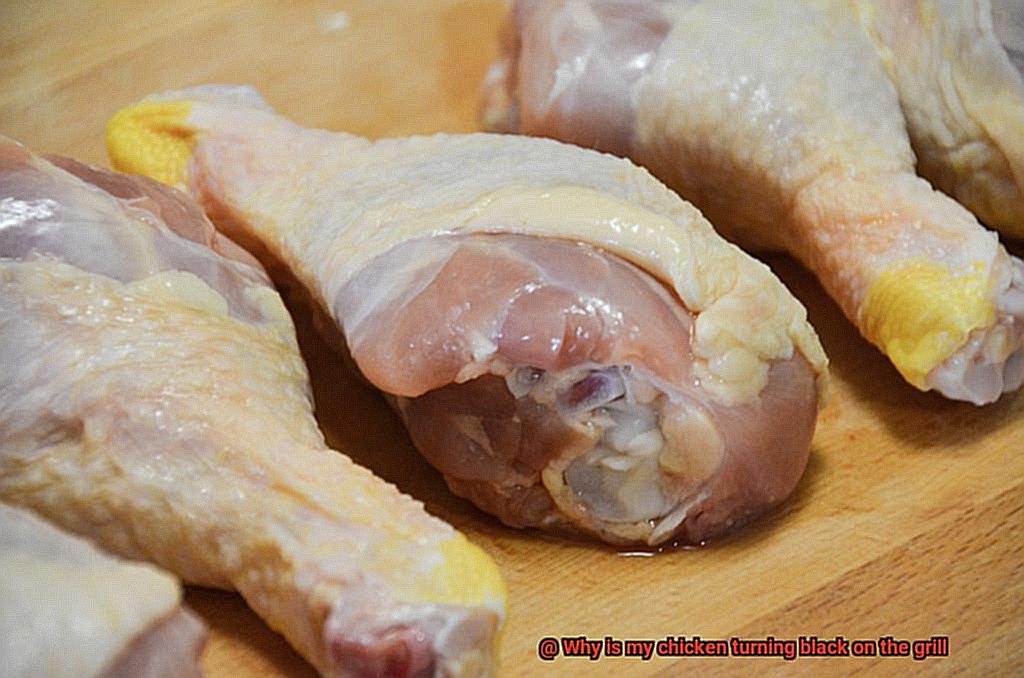Summer is here, and what better way to celebrate than firing up the grill for some mouthwatering chicken? But wait, why is your chicken turning black on the grill? Is it just a burnt crust or something more sinister? Fear not, we’ve got the answers you need.
Grilling is an art form that requires precision and finesse. However, even the most experienced grillers can fall victim to blackened chicken. There are several factors that can cause this unsavory outcome, from the type of grill to the seasoning and temperature.
In this post, we’ll dive into the reasons behind your blackened chicken and provide tips to prevent it from happening again. We’ll cover everything from choosing the right grill to marinating techniques and cooking temperatures.
Whether you’re a seasoned griller or just starting out, our expert advice will help you achieve perfectly cooked chicken every time. So grab your tongs and let’s get grilling.
Contents
Reasons for Chicken Blackening on the Grill
Grilling chicken is a beloved pastime that brings families and friends together, but it can quickly turn frustrating when the chicken turns black on the grill. However, fear not. There are several reasons why this happens, and understanding them can help prevent it from happening in the future.
High Heat
One of the primary reasons for blackening chicken on the grill is using high heat. When the grill is too hot, it can cause the chicken to cook unevenly, resulting in the exterior of the chicken blackening and even burning. To prevent this, it’s essential to preheat your grill properly and adjust the heat as needed throughout the cooking process. Try cooking your chicken on lower heat or moving it to a cooler part of the grill.
Sugary Marinades
Another reason why your chicken might be turning black on the grill is due to marinades or sauces that contain sugar. Sugar can easily burn when exposed to high heat and cause your chicken to turn black. Consider using marinades or sauces that don’t contain sugar or reducing the amount of sugar in your recipe to avoid this issue.
Lack of Oil
A lack of oil is another factor that can cause chicken to turn black on the grill. When chicken doesn’t have enough oil, it can stick to the grill and burn. To prevent this, make sure to oil your grill grates before cooking and brush some oil onto your chicken before placing it on the grill. This will help keep your chicken moist and prevent it from sticking.
Overcooking
Overcooking is another reason for chicken blackening on the grill. Leaving your chicken on the grill for too long can cause it to become dry and turn black. To avoid this, monitor the internal temperature of your chicken using a meat thermometer and remove it from the grill once it reaches an internal temperature of 165°F.
Dirty Grill
Using a dirty grill can also cause chicken to turn black on the grill. Leftover debris and grease on the grates can cause uneven cooking and burning. To prevent this, make sure to clean your grill thoroughly before each use. This will ensure that your chicken cooks evenly and doesn’t turn black due to debris on the grill.
In conclusion, there are several reasons why chicken may turn black on the grill, including high heat, sugary marinades, lack of oil, overcooking, and a dirty grill. By understanding these factors and taking steps to prevent them from happening, you can ensure that your grilled chicken comes out looking and tasting delicious every time.
Caramelization of Sugars in Marinade or Sauce
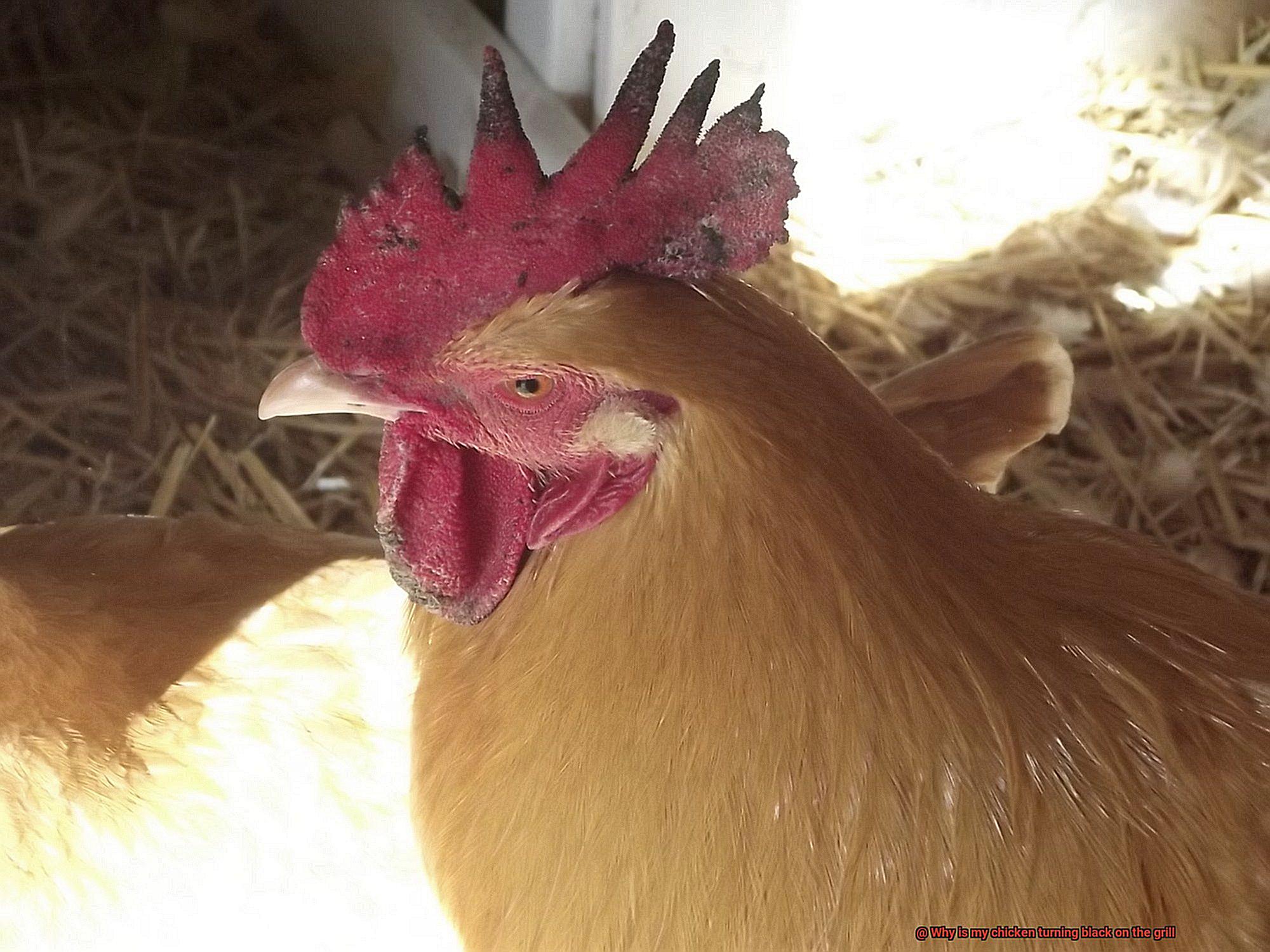
Grilling chicken is more than just a cooking technique; it’s an art that requires attention to detail and finesse. One of the key factors in achieving a perfectly grilled chicken is using a marinade or sauce to enhance flavor and tenderness. However, the sugars in these marinades or sauces can sometimes lead to blackening on the grill, which can severely affect the taste and appearance of your dish. In this article, we’ll explore the process of caramelization of sugars in marinades or sauces and how it can impact your grilled chicken.
Caramelization is a chemical reaction that occurs when sugars are exposed to high heat, causing them to break down and brown. This process not only creates a delicious crust on the chicken but can also lead to burnt and blackened meat if left on the grill for too long. The sugars present in marinades or sauces can contribute to this process, which is why it’s essential to pay attention to cooking time and temperature while grilling chicken.
To avoid blackening on the grill, it’s crucial to monitor both the cooking time and temperature of your chicken. Keeping an eye on the meat’s color and removing it from the grill once it has reached a golden brown color ensures that your chicken is cooked through without being overcooked.
Choosing lower sugar content marinades or sauces is another way to avoid blackening. Opting for marinades that use vinegar or citrus juices as a base instead of sugary sauces like barbecue or teriyaki still provides flavor and moisture to your meat without contributing to excessive caramelization.
Dark-Colored Marinades and Rubs
Well, you might want to take a closer look at the dark-colored marinades and rubs you’re using. While soy sauce, Worcestershire sauce, and brown sugar are tasty ingredients that can add depth of flavor to your chicken, they can also be the culprits behind excessive blackening.
When exposed to high heat on the grill, the sugars in these ingredients caramelize quickly, resulting in an unappetizing burnt appearance. But fear not, with a few simple tips and techniques, you can prevent this from happening and still enjoy the delicious flavors of your favorite marinades and rubs.
Firstly, be mindful of the color of your marinades and rubs before slathering them on your chicken. If you’re worried about excessive blackening, opt for lighter-colored options or try adjusting cooking times and temperatures to ensure even cooking without burning.
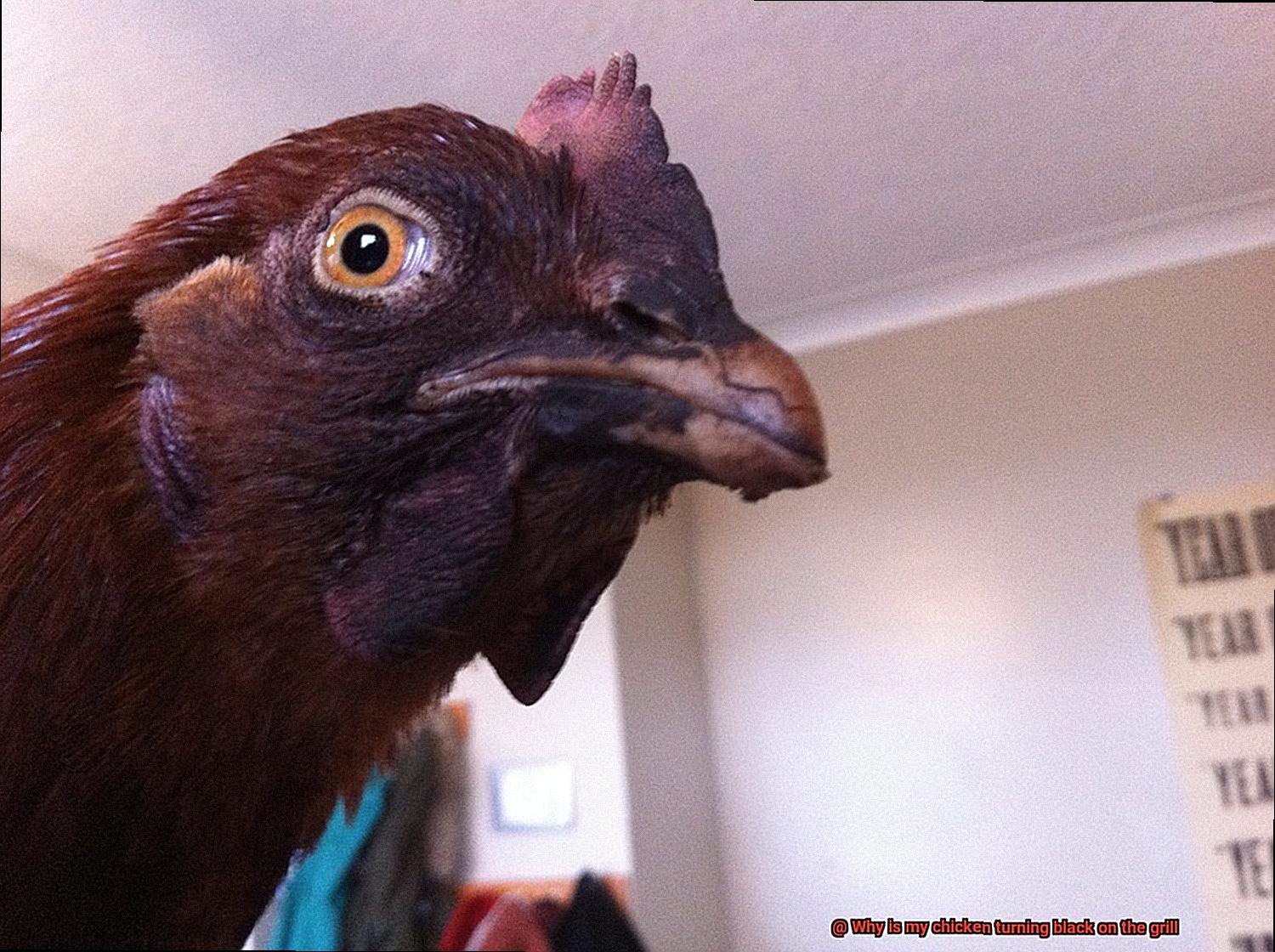
Another helpful tip is to brush off any excess marinade or rub before grilling. This will help prevent any sugars from caramelizing too quickly and turning your chicken black.
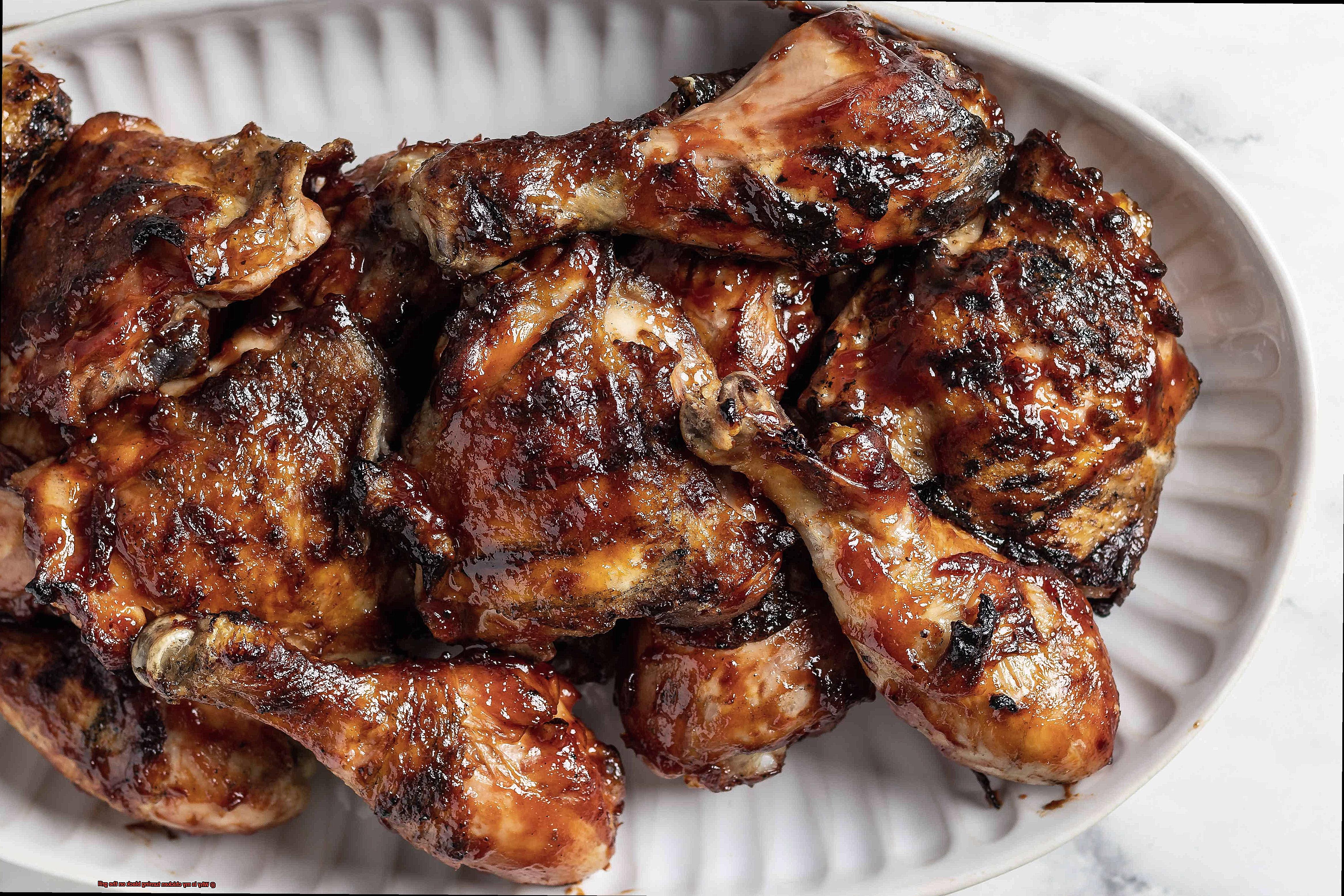
Here are some additional tips to keep in mind:
- Don’t overcrowd your grill. This can cause uneven cooking and increase the likelihood of burning.
- Use indirect heat. This means placing your chicken on a cooler part of the grill to ensure even cooking without excessive charring.
- Marinate for shorter periods of time. While marinating adds flavor and tenderness to your chicken, marinating for too long can result in burnt flavors and blackened appearance.
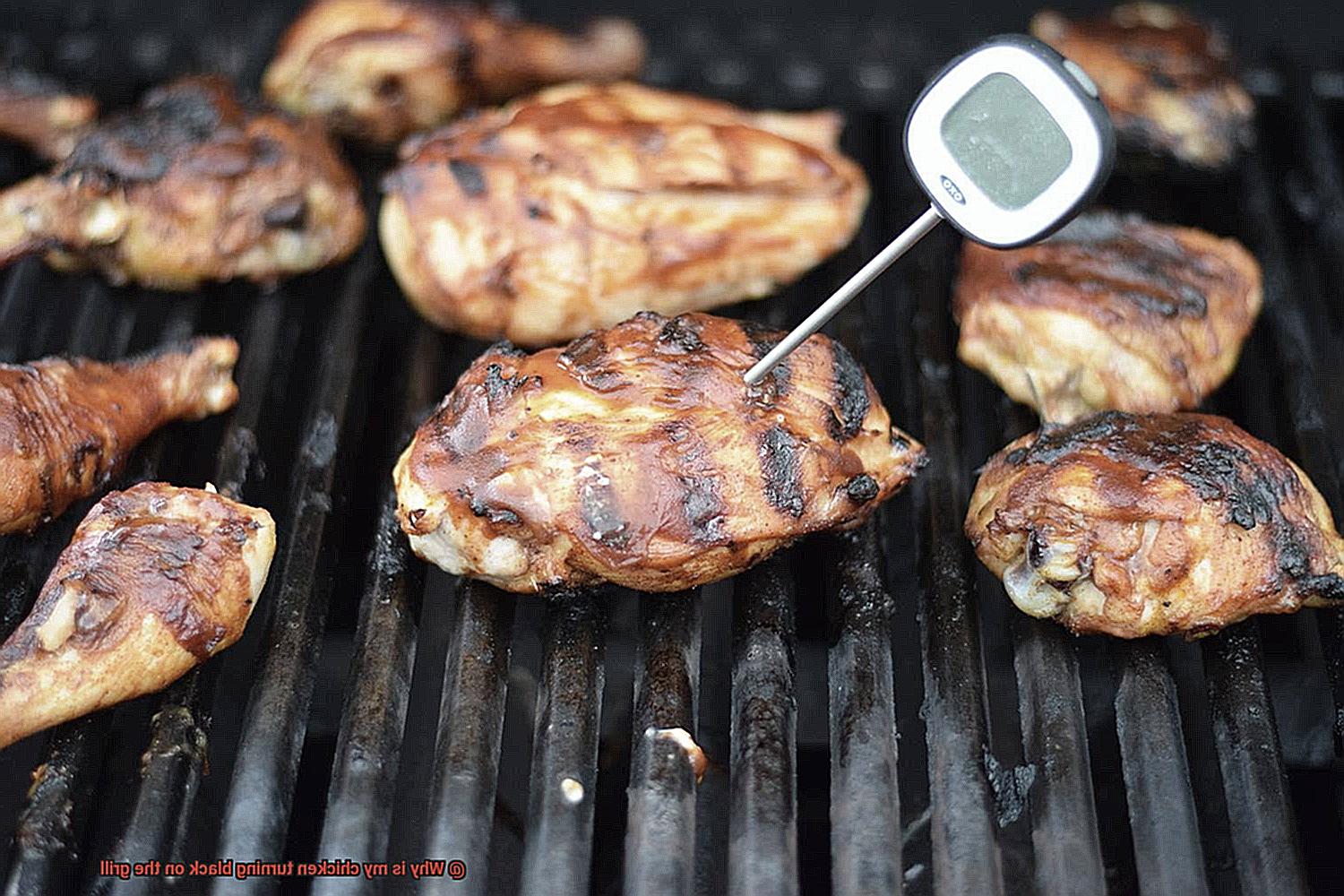
Overcooking as a Cause of Chicken Blackening
Fear not, as we have done our research and discovered that overcooking is the primary culprit behind chicken blackening on the grill. To ensure that your chicken is grilled to perfection every time, here are some essential tips to keep in mind.
First and foremost, it’s crucial to monitor the temperature of your grill and the internal temperature of your chicken. If the grill is too hot or if the chicken is left on for too long, it will burn on the outside while remaining raw on the inside. Trust us, nobody wants that. To avoid this, use a meat thermometer to check the internal temperature of your chicken regularly. Once it reaches a safe temperature of 165°F (74°C), remove it from the grill promptly.
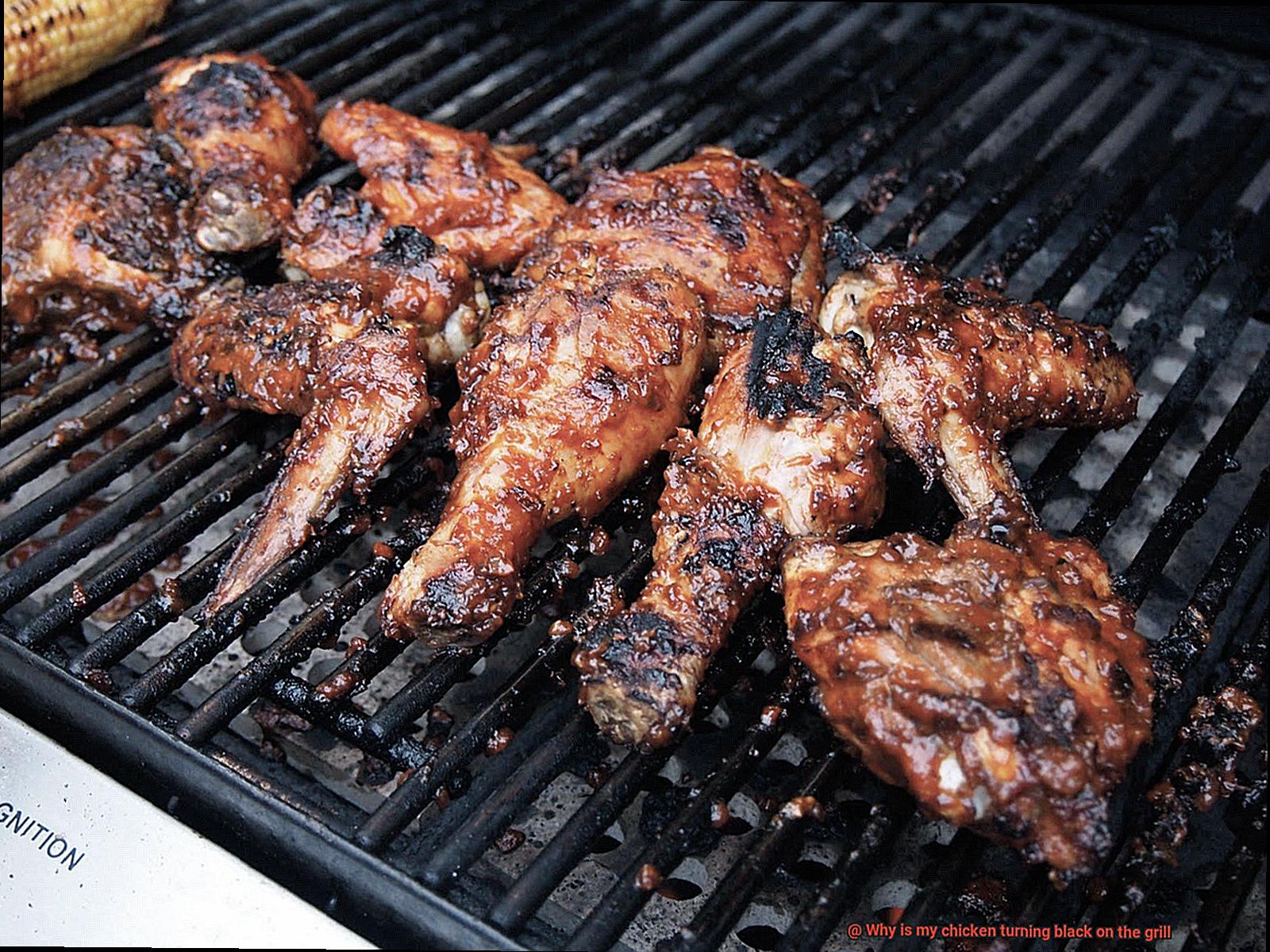
Here’s another pro tip: let your chicken rest for a few minutes before cutting into it. This allows the juices to redistribute throughout the meat, making it more tender and juicy. Cutting into it too soon can cause those precious juices to escape, leaving you with dry, overcooked chicken. No thank you.
It’s also essential to avoid using sugary marinades or sauces as they can cause blackening on the grill. The sugars in these sauces can caramelize and burn quickly, leaving you with unappetizing-looking chicken. Instead, opt for low-sugar marinades or sauces or only baste your chicken with them during the last few minutes of cooking.
Preventing Chicken from Turning Black on the Grill
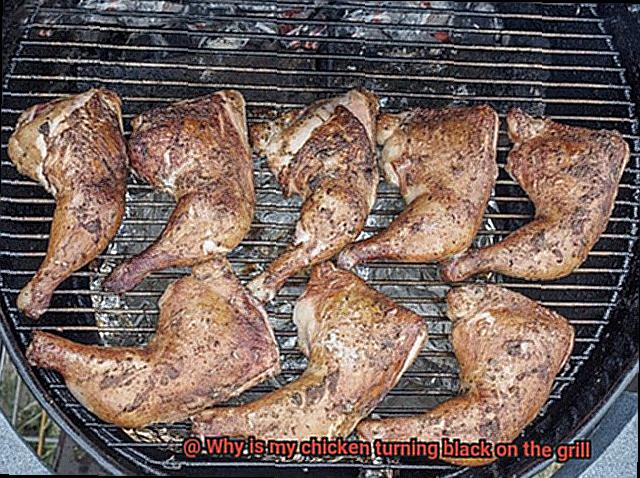
Grilling chicken can be a delicious and satisfying experience, but it’s not always easy to get it right. One of the most common problems people face is the meat turning black on the grill. This can happen for several reasons, including overcooking, incorrect heat settings, and using sugary marinades or sauces. However, with a few simple tips and tricks, you can easily prevent your chicken from turning black on the grill and enjoy a perfectly cooked meal every time.
Firstly, it’s essential to preheat your grill properly before cooking your chicken. This ensures that the heat is distributed evenly and prevents any hot spots from forming. Adjusting the heat settings based on the thickness of your chicken is also crucial. Thicker cuts require lower heat than thinner cuts to cook properly, so keep this in mind when setting up your grill.
Next, it’s important to choose your marinades and sauces wisely. Sugary marinades or sauces can easily burn and cause your chicken to turn black on the grill. Instead, opt for marinades that contain acidic ingredients like lemon juice or vinegar. These help to tenderize the meat and prevent it from sticking to the grill while adding flavor without burning.
Flipping your chicken frequently while grilling is another effective way to prevent blackening. This ensures that both sides cook evenly and prevents any charring or burning on one side. You can also use a meat thermometer to check the internal temperature of your chicken and ensure that it’s cooked thoroughly without overcooking and turning black.
Lastly, don’t forget to let your chicken rest for a few minutes after grilling before cutting into it. This allows the juices to redistribute throughout the meat, preventing dryness or toughness.
Monitoring Cooking Time and Temperature Closely
If you’re a fan of grilling chicken, then you know how important it is to cook it just right. No one wants to bite into a piece of chicken that is burnt on the outside and raw on the inside. That’s why monitoring cooking time and temperature closely is essential. By following some best practices, you can ensure your chicken turns out perfectly every time.
To prevent your chicken from turning black on the grill, you need to use a thermometer. Checking the internal temperature of the chicken is crucial to make sure it’s cooked through safely. The safe temperature for chicken is 165°F, so make sure to use a thermometer to check.
Another way to prevent your chicken from turning black is by using indirect heat. Placing the chicken on the cooler part of the grill rather than directly over the flame allows it to cook evenly without burning. Flipping the chicken frequently will also help distribute heat evenly and prevent it from burning.
Marinating your chicken before grilling is another great way to ensure it stays moist and tender while cooking. A good marinade not only adds flavor but also helps in keeping the meat juicy.
In conclusion, monitoring cooking time and temperature closely is key to grilling delicious and juicy chicken without burning or turning black. Here are some best practices to follow:
- Use a thermometer to check the internal temperature of the chicken.
- Use indirect heat by placing the chicken on the cooler part of the grill.
- Flip the chicken frequently to distribute heat evenly.
- Marinate your chicken before grilling for added flavor and moisture.
Using Lighter-Colored Marinades and Rubs
Grilling is a true art form that requires attention to detail and precision. But, there’s nothing worse than biting into a piece of chicken that’s blackened and charred from being exposed to high heat. Fortunately, I have a grilling tip that will take your chicken game to the next level: using lighter-colored marinades and rubs.
Why does this work? Darker-colored marinades and rubs contain sugars that can easily burn when exposed to high heat. This burning can cause your chicken to turn black and taste unpleasant. By using lighter-colored marinades and rubs, you can avoid this issue altogether.
So, what should you use instead? One of my favorite marinades is a simple mixture of olive oil, lemon juice, garlic, and herbs such as thyme or rosemary. Not only will this add a delicious flavor to your chicken, but it will also help keep it moist during cooking. Be sure to let the chicken sit in the marinade for at least 30 minutes before grilling to ensure the flavors fully penetrate the meat.
If you prefer using rubs over marinades, then consider mixing together spices such as paprika, cumin, coriander, and chili powder. These spices will add a smoky flavor to your chicken without causing it to turn black.
But wait, there’s more. Using lighter-colored marinades and rubs can also bring additional benefits. For example:
- Lighter-colored marinades and rubs with less sugar content tend to be healthier options overall.
- These marinades can also allow the natural flavors of the chicken to shine through.
- Using lighter-colored marinades and rubs can broaden your grilling horizons by allowing you to experiment with different flavor profiles.
Conclusion – Tips to Avoid Chicken Blackening on the Grill
Grilling chicken is a beloved pastime for many people, but it can be frustrating when the chicken turns black on the outside. Fortunately, there are several tips you can follow to prevent this from happening and ensure that your chicken is juicy and perfectly cooked every time you grill.
The first tip is to marinate your chicken properly. A good marinade not only adds flavor but also keeps the chicken moist while on the grill. For the best results, use a marinade that contains acidic ingredients like vinegar or lemon juice, which help break down the proteins in the chicken and make it more tender.
The second tip is to preheat your grill before cooking. This step helps sanitize the grill grates and ensures that they are hot enough to create those classic grill marks on your chicken.
The third tip is to use a cooking spray or brush the grill grates with oil before placing the chicken on them. This prevents sticking and ensures even cooking. However, be careful not to use too much oil as it can cause flare-ups and lead to blackened chicken.
The fourth tip is to avoid overcrowding the grill. Overcrowding can cause some pieces of chicken to char while others remain undercooked, leading to an unevenly cooked meal. It’s better to cook in batches if necessary.
Lastly, use a meat thermometer to check if the chicken is cooked through. Chicken should reach an internal temperature of 165°F (74°C) to avoid undercooking or overcooking, which can cause dryness or even foodborne illness.
Conclusion
In the world of grilling, achieving perfectly cooked chicken can be a tricky task. However, with attention to detail and precision, your grilled chicken can turn out juicy and delicious every time. Blackening of chicken on the grill is a common problem that can occur due to various reasons such as high heat, sugary marinades or sauces, lack of oil, overcooking, or a dirty grill.
By following some simple tips and tricks, you can prevent your chicken from turning black on the grill and enjoy a mouthwatering meal. To start with, it’s essential to monitor cooking time and temperature closely using a thermometer. Additionally, placing the chicken on the cooler part of the grill using indirect heat can help prevent blackening.
Marinating your chicken properly with acidic ingredients like vinegar or lemon juice not only adds flavor but also prevents burning. Preheating your grill before cooking helps sanitize the grill grates and ensures even cooking with classic grill marks. Using a cooking spray or brushing the grill grates with oil before placing the chicken prevents sticking and overcrowding on the grill.
Choosing lighter-colored marinades and rubs with less sugar content can also help prevent blackening while adding flavor to your dish. With these simple tips in mind, you’re sure to achieve perfectly grilled juicy chicken every time you fire up your grill this summer season or any other day of the year.
In conclusion, grilling chicken is an art form that requires attention to detail and precision. But by following these tips and tricks, you’ll be able to create delicious meals that will impress everyone at your next barbecue gathering.

